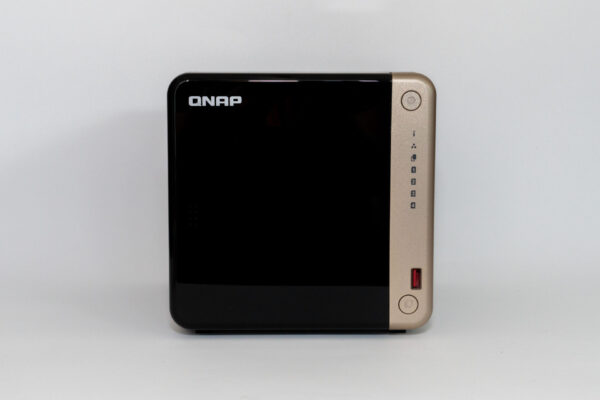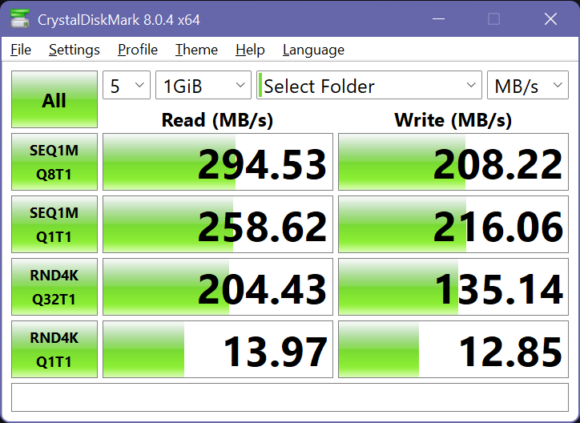
I reported some filesystem speed test on the QNAP TS-464 with IronWolf disks recently. Those were done with a 1 Gbps network connection, and I promised an update using a 2.5 Gbps network connection. This is the update post.
Just a quick summary from earlier tests using a 1 Gbps network connection. The QNAP TS-464 performed very well. Basically, the 1 Gbps network bandwidth is pretty much maxed out. The disks were fast enough, and the TS-464 itself kept pace. The network was the bottleneck.
Seeing that the QNAP TS-464 had 2x 2.5 GbE ports on its back, it seemed to make sense that I should test at 2.5 GbE connection speeds. I originally did not do this as my original test setup did not support 2.5 GbE. Fortunately, I have an Intel NUC 11 PC that has a 2.5 GbE port, so I’ve now done some additional testing using a 2.5 GbE connection to the TS-464.
The TL;DR is that the QNAP TS-464 fared very well. It appears that I might have again hit a bottleneck with network. Look at the test run of CrystalDiskMark. This is for disks in RAID1 with volume encryption turned on.

The following table shows average speeds in MB/s over multiple test runs of sequential 1M reads/writes under a variety of configurations.
| Q8T1 Read | Q8T1 Write | Q1T1 Read | Q1T1 Write | |
| RAID1 w/ encryption | 291.416 | 211.754 | 257.722 | 214.486 |
| RAID1 no encryption | 290.68 | 226.184 | 254.52 | 229.312 |
| RAID0 w/ encryption | 292.002 | 293.898 | 256.934 | 254.078 |
| RAID0 no encryption | 290.984 | 292.614 | 257.526 | 260.128 |
These results basically say that the QNAP TS-464 is not impacted by encryption. This is great, because for me, encryption of data at rest (i.e. data stored on disk is encrypted) is absolutely required. It would be a pity if I had to accept some performance penalty from wanting encryption. As you can observe in the table above, you do get some penalty in RAID1 writes, which makes sense, since you need to write data twice.
The next table shows average speeds in MB/s over multiple test runs of random 4K reads/writes under the same set of configurations.
| Q32T1 Read | Q32T1 Write | Q1T1 Read | Q1T1 Write | |
| RAID1 w/ encryption | 200.024 | 146.28 | 15.524 | 12.694 |
| RAID1 no encryption | 205.52 | 160.362 | 17.794 | 12.29 |
| RAID0 w/ encryption | 197.15 | 148.596 | 16.952 | 11.978 |
| RAID0 no encryption | 197.674 | 188.74 | 17.884 | 11.704 |
With random I/O, the disk performance slows down appreciably. These are conventional spinning hard disk drives, so it is understandably so. Clearly, the use of encryption or not, or the choice of RAID1 or RAID0, has not much impact to performance.
I also ran tests with the disks in RAID6 (double parity) configuration, with encryption. The sequential performance does not differ much from RAID0 with encryption. So that’s really nice. The figures for the random 4K tests are a bit strange: mostly all similar, except the Q32T1 writes are significantly worse.
| RAID6 w/ encryption | |
| SEQ1M Q8T1 Read | 293.252 |
| SEQ1M Q8T1 Write | 295.692 |
| SEQ1M Q1T1 Read | 253.902 |
| SEQ1M Q1T1 Write | 249.992 |
| RND4K Q32T1 Read | 207.172 |
| RND4K Q32T1 Write | 85.714 |
| RND4K Q1T1 Read | 17.496 |
| RND4K Q1T1 Write | 12.774 |
I believe the burden of writing extra parity has significantly impacted the random 4K multi-queue performance.
Note that these tests were done with Seagate IronWolf NAS drives. There is no NVMe cache or QNAP’s Q-Tier feature enabled.
In conclusion, these tests show that the QNAP TS-464 offers truly excellent performance. It can definitely fill up the 2.5 GbE network connection, even with encryption enabled. I expect you can get greater performance with port-channelling (i.e. the 2x TS464’s 2.5 GbE ports aggregated together) but I don’t have the setup to test that out.
View Comment Policy